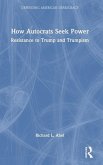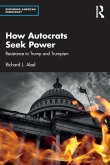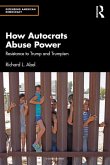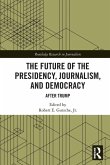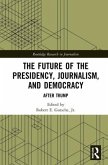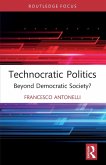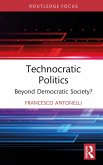Chronicling and analyzing resistance to the threat that autocracy poses to American liberal democracy, this book provides the definitive account of Trump's assault on truth and his populist attacks on expertise, as well as scientific and legal opposition to them.
This book is about the threat of autocracy, which antedated Donald Trump and will persist after he leaves the stage. Pandering to populists, autocrats attack professional expertise in an Orwellian world, where "ignorance is strength" and where, as Hannah Arendt wrote, people "believe everything and nothing." Trump sought to inflame xenophobia by blaming China for the pandemic and closing U.S. borders, then declaring victory and, when that proved premature, wrongly blaming the number of tests for escalating cases. He sought to muzzle government scientists and denounced those who defied or evaded his directives as members of the "deep state," preferring to rely on inexpert buddies. He elevated obscure scientistswho promoted quack cures and opposed effective preventive measures while sidelining the few reputable experts, who nevertheless courageously resisted political interference. In addition to these, as this book documents, independent scientists, scientific journals and professional associations also outspoken, often more so. Even the pharmaceutical industry sought to preserve the integrity of a federal bureaucracy that assured the public the drugs they consumed were safe and efficacious. Following Trump's numerous efforts to distort and undermine expertise, this book describes and evaluates the resilience of scientific and legal defenses of truth.
This definitive account and analysis of Trump's populist rejection of truth and expertise will appeal to scholars, students and others with interests in politics, populism and the rule of law and, more specifically, to those concerned with resisting the threat that autocracy poses to liberal democracy.
This book is about the threat of autocracy, which antedated Donald Trump and will persist after he leaves the stage. Pandering to populists, autocrats attack professional expertise in an Orwellian world, where "ignorance is strength" and where, as Hannah Arendt wrote, people "believe everything and nothing." Trump sought to inflame xenophobia by blaming China for the pandemic and closing U.S. borders, then declaring victory and, when that proved premature, wrongly blaming the number of tests for escalating cases. He sought to muzzle government scientists and denounced those who defied or evaded his directives as members of the "deep state," preferring to rely on inexpert buddies. He elevated obscure scientistswho promoted quack cures and opposed effective preventive measures while sidelining the few reputable experts, who nevertheless courageously resisted political interference. In addition to these, as this book documents, independent scientists, scientific journals and professional associations also outspoken, often more so. Even the pharmaceutical industry sought to preserve the integrity of a federal bureaucracy that assured the public the drugs they consumed were safe and efficacious. Following Trump's numerous efforts to distort and undermine expertise, this book describes and evaluates the resilience of scientific and legal defenses of truth.
This definitive account and analysis of Trump's populist rejection of truth and expertise will appeal to scholars, students and others with interests in politics, populism and the rule of law and, more specifically, to those concerned with resisting the threat that autocracy poses to liberal democracy.



